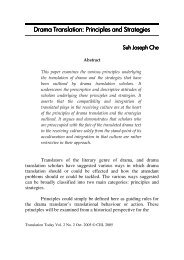Re-Evaluation of Lin Shu (the Chinese Translator) - National ...
Re-Evaluation of Lin Shu (the Chinese Translator) - National ...
Re-Evaluation of Lin Shu (the Chinese Translator) - National ...
You also want an ePaper? Increase the reach of your titles
YUMPU automatically turns print PDFs into web optimized ePapers that Google loves.
162 <strong>Re</strong>-<strong>Evaluation</strong> <strong>of</strong> <strong>Lin</strong> <strong>Shu</strong> (<strong>the</strong> <strong>Chinese</strong> <strong>Translator</strong>):A Systemic Approach to Literary Translation<strong>Chinese</strong> populace to save and streng<strong>the</strong>n <strong>the</strong> nation. On <strong>the</strong> contrary,<strong>Chinese</strong> dramas could not fulfill this duty owing to its slow rhythmand stylized form <strong>of</strong> artistic performance. Fur<strong>the</strong>rmore, <strong>the</strong>prevalence <strong>of</strong> fiction made fiction writers and translators get paidwhile drama producers could not benefit financially. <strong>Lin</strong> <strong>Shu</strong>, as afamous fiction translator, could get <strong>the</strong> highest pay among fictionproducers. So <strong>Lin</strong> <strong>Shu</strong> would ra<strong>the</strong>r change <strong>the</strong> style <strong>of</strong> <strong>the</strong> original.Poetics and <strong>Lin</strong> <strong>Shu</strong>’s TranslationsPoetics is concerned with linguistic and literary levels in agiven culture. To better deal with <strong>the</strong> relationship between poeticsand <strong>Lin</strong> <strong>Shu</strong>’s translations, this part investigates <strong>the</strong> influence <strong>of</strong>poetics first on language system, <strong>the</strong>n on narration modes and finallyon literary style.A. Language System and Translation Strategies Adopted by <strong>Lin</strong><strong>Shu</strong>Translation first involves <strong>the</strong> transformation between twolanguages. Translated works convey <strong>the</strong> content <strong>of</strong> <strong>the</strong> originalthrough <strong>the</strong> medium <strong>of</strong> target language. How a translatorsuccessfully transforms <strong>the</strong> original in <strong>the</strong> target language iscertainly related to <strong>the</strong> language environment <strong>of</strong> his time. At <strong>the</strong>same time, characteristics and limitations <strong>of</strong> <strong>the</strong> target languagesurely dictate a translator’s choice for certain strategies.Classical <strong>Chinese</strong> had long been <strong>the</strong> dominant languagestyle in <strong>Chinese</strong> language system. Fiction translators at <strong>the</strong> turn <strong>of</strong><strong>the</strong> twentieth century including <strong>Lin</strong> <strong>Shu</strong> and Liang Qichao produced<strong>the</strong>ir versions in classical <strong>Chinese</strong> in that classical <strong>Chinese</strong> couldenhance <strong>the</strong> status <strong>of</strong> fiction that had been despised by most literatifor several centuries. At that time, no one, especially a political
















